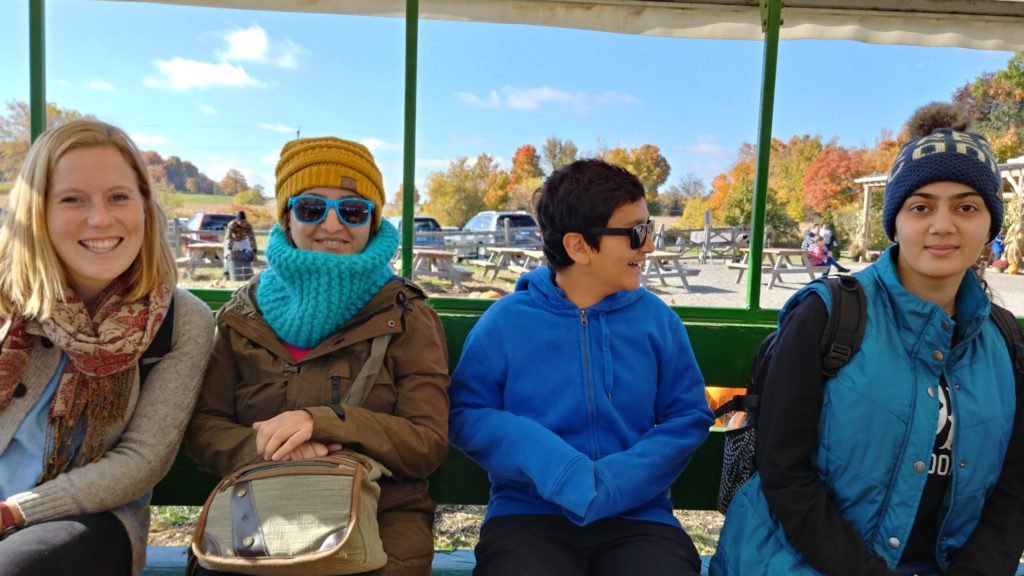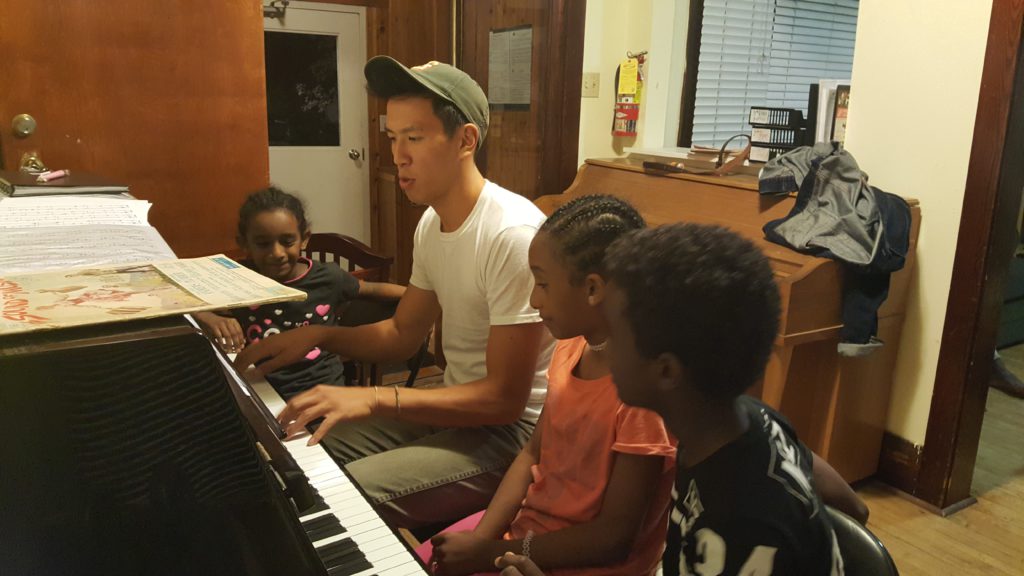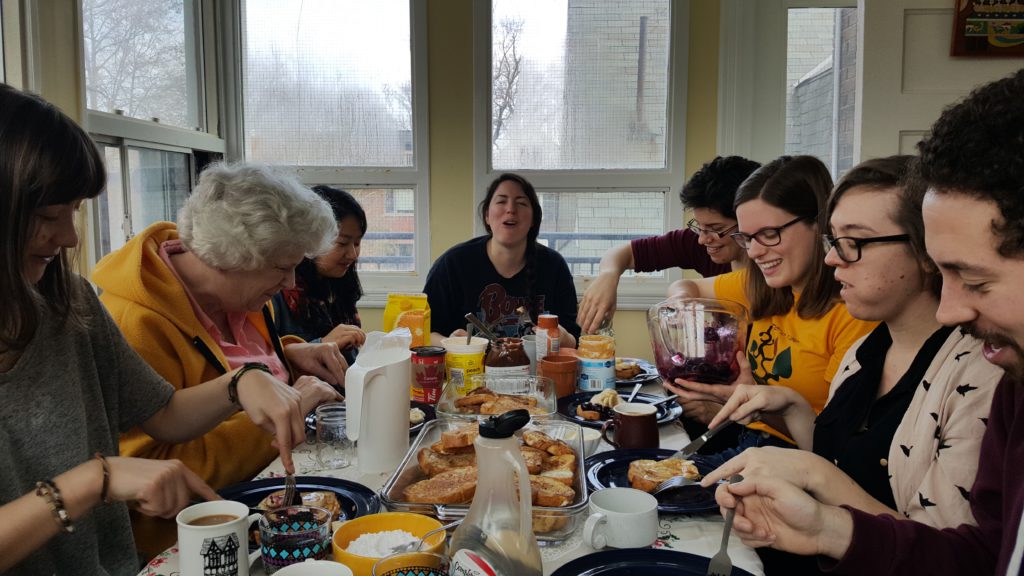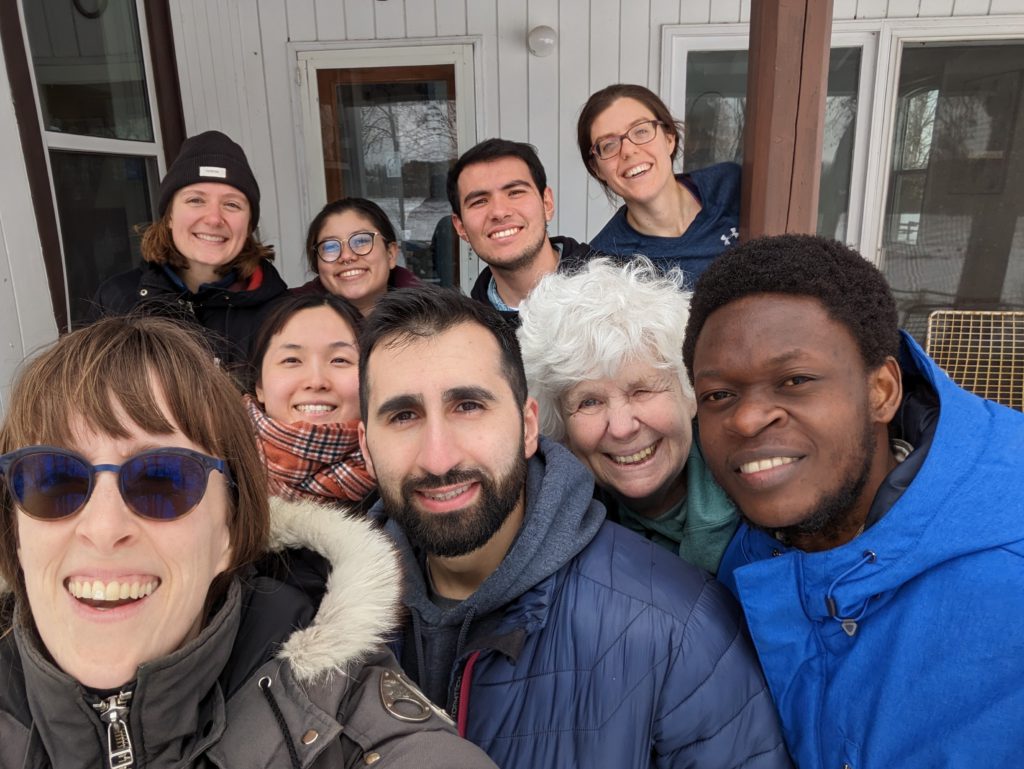If you are interested in applying for the Worker Program,
please read the information below carefully and then fill out this form.




The Worker Program
Are you looking for a challenge? Are you looking to grow personally and professionally? Does the idea of living and working in the same community excite you? Consider applying to the Worker Program!
The Worker Program invites young people to live and work at Romero House, a community of welcome for refugees, for a period of one year. The program consists of three main aspects: work life, community life and intentional community:
Work Life
Each worker will support 3-5 families living at Romero House as a companion. This involves walking alongside those families through their settlement process and providing wrap-around support. In addition, each worker will have a another role that supports to work of Romero House.
Worker roles for 2024-2024 may include
– Community Programming
– Coordinating our Community Host Program
– Volunteer Coordination
– Bookkeeping Support
– Communications (social media, newsletter, fundraising, website etc.)
– Housing Support (apartment stocking, meeting with families to sign housing agreements etc.)
Workers work 4 days a week. They work alongside other participants in the program as well as other live-in and live-out staff.
Community Life
In addition to working in the office, Workers live in one of the Romero Houses, with 2-3 families in each house. Workers share their apartment with one other worker. Workers support our community life through coordinating house meetings, monthly suppers with all four houses, birthday parties and many other gatherings. The goal is for workers to build relationships with the families living at Romero House and foster a space in which families can build connections with each other.
Intentional Community
The Worker Program also involves participating in an intentional community with the other Workers and staff (8-12 people total), around a set of shared values and practices. These practices include a weekly supper and weekend retreats outside the city 3-4 times per year. The Worker group also participates in a weekly reflection group on professional and spiritual themes (rooted in a Catholic tradition with an openness to a wider spirituality) and a monthly teambuilding activity. We support Workers in developing skills in self-awareness, communication, conflict navigation, and giving and receiving care.
This full-time live-in program gives people the opportunity to live alongside refugees in a spirit of service and mutual care.
From Former Workers
“Being a Worker is stepping into a role of meaningful responsibility. It is gratifying and fun. It is a chance to be part of a community that existed before you, and will continue after you. It is an opportunity to serve, make a difference, and to do something real. It is busy! In this world, giving without expecting to receive is not something everyone is able to do. Workers can dedicate themselves to work they believe in, without needing to measure time and energy.”
Marin
2012-2014
“Having studied philosophy, I had many theories about what it means to welcome the stranger and how to build a community. My theories and preconceptions were challenged at Romero House. I came to realize that ‘the stranger,’ is not that strange, that I can cook with a couple from Venezuela, teach piano to a girl from Turkey, talk about classic films with a man from Pakistan, and watch horror movies with a teenager from Colombia.”
James
2017-2018
“I’m particularly grateful for the practical experience and training offered through the Worker program. I’ve been able to attend conferences, training workshops, and courses that I would never have been able to otherwise. I’ve valued them not only as opportunities to develop my understanding of the refugee settlement field, but also as an affirmation that Romero House is as genuinely committed to investing its Workers as we are to the work we do here.”
Claire
2019-2021
Responsibilities of a Romero Worker
Settlement Support
Accompaniment is at the heart of Romero House. Each Worker accompanies several families at a time throughout their immigration and settlement journey. Workers are not expected to be experts on the refugee process, but to walk alongside the refugees so they don’t need to navigate complicated systems alone.
Community Life
Workers are responsible for running the many programs that animate our community life. These programs shift based on the gifts of the Workers and the needs of the families. Common programs include women’s group, kid’s club, March break camp, garden coordination and the planning of many celebrations.
House Coordination
As each Worker lives in one of our houses alongside two or three families, they are given the great responsibility of facilitating a safe and welcoming home. This means running regular house meetings, ensuring mutual care-taking of the home and maintaining good relationships with the neighbours.
Advocacy + Public Education
Living in solidarity with refugees means taking action where there are injustices in laws and systems. There lots of opportunities for advocacy and public education. It also means attending networking meetings with various advocacy groups, such as the Canadian Council for Refugees or the Ontario Coalition of Service Providers for Refugee Claimants.
Worker Role
Each worker has a role that supports the work of Romero House. These roles are more administrative and are a great way to gain skills in running a non-profit. Worker roles may include: Community Programming, Community Host Program Coordinator, Volunteer Coordination, Bookkeeping Support, Communications and Housing Support.
Frequently Asked Questions
Is there any eligibility criteria?
To be eligible for the Worker program you must:
- Be over 19 years of age
- Have completed high school. Post-Secondary education / training is an asset.
- Demonstrate emotional maturity and good judgment.
- Be comfortable communicating in written and spoken English.
- Have legal authorization to work in Canada for the duration of the program.
What are the qualities of an ideal Worker?
We seek Workers with some of the following qualities and perspectives:
- A commitment to social justice
- A desire to give oneself to others in a free and generous spirit
- A willingness to work and live in unfamiliar situations
- An interest in and excitement about learning from other
cultures - A willingness to work hard with competence, care and independence
- An ability to take initiative and assume great responsibility
- A desire to live in a spirit of simplicity and solidarity, resisting the material inclinations of our culture
What is the program duration?
The full year program runs from Tuesday, September 2, 2024 until Friday, August 29. The summer program runs from May to August.
We ask that Workers make a commitment for that whole period and do not consider other positions or programs that start before the expected end of their times as worker.
The program includes spending December 25 at Romero House. This is often a difficult time for refugees because they are far from loved ones at a time when culturally we are often with family, whether or not they celebrate Christmas.
Do I need to be a Christian to Apply?
No! Workers of all faiths and traditions are welcome at Romero House.
We do ask that Workers commit to participating in the rituals that root us while we engage in demanding work, primarily in the form of twice weekly morning prayer and semi-weekly spiritual reflection, led by Mary Jo. Workers are encouraged, but not required, to participate in monthly community liturgy. Our weekly prayer is rooted in a Christian tradition and open to a wider spirituality. Monthly liturgies are in the Catholic tradition.
We encourage Workers to share their own traditions and sense of spirituality, particularly in our morning prayer, which we take turns leading. We have had Workers who are Jewish, Muslim, Hindu, Christian, Agnostic and Atheist. We are not out to convert anyone or ask anyone to pretend they are something they are not.
It is also important to note that we have a strict non-proselytization policy when it comes to interacting with Romero House residents; that is, we do not try to convert any refugees to a different religion.
How are Workers compensated?
The Worker Program includes a voluntary aspect that is part of choosing to live in an intentional community (e.g. sharing tea, attending house meetings,, running community events) as well as paid work for the legal and settlement support for refugee claimants and administrative parts of the role. We look for people with a desire to live in a spirit of simplicity and solidarity, resisting the material inclinations of our culture. Workers are supported in the following ways:
- Housing provided (Accommodations in a shared room or apartment)
- Annual salary of approximately $24,000 CAD gross
- Health Spending Account for expenses related to uninsured medical services, dental, vision, etc.
- Four day work week for settlement and administrative work (house coordination and community life is throughout the week and considered volunteer work)
- Approx. 4 weeks paid vacation (3 weeks + time off for the period between Christmas and New Year’s)
- 10 paid sick days
- Access to a bike
- Cell phone costs up to $50/month
- Flexible work hours
- Hybrid (combined working from home, from Romero House Centre/office, and elsewhere in the community)
- Professional development and training
- Free tickets to cultural and sporting events to attend with Romero House families
- Access to a personal mentor or spiritual director
- Team retreats
Do I need to speak a second language?
It is not a requirement to speak a second language, however it is extremely useful. The most commonly spoken language after English is Spanish. Other useful languages include Arabic, French, Urdu, Tigrinya, Kurdish, Farsi and Amharic.
Do I need to have prior knowledge of the refugee system or social services?
Although it is helpful, Workers are not required to have prior knowledge of the Canadian immigration system or the social services available to refugees. There significant training and shared resources. Workers will be supported by the team as they learn by doing.
Is living in a requirement?
Yes, this is a live-in program. It is a very important part of being a community together. And living together as neighbours to the refugee families is a core tenet of Romero House.
If you live very close and are interested in living out, let us know and we discuss that possibility.
What kinds of careers do former Workers end up in?
The sky is the limit! We have seen Workers go into areas such as:
- Social Work or counselling
- Newcomer and Refugee Settlement Sector
- Legal profession
- Teaching or academia
- Government bureaucracy
- Health care or public health
- Non-profit work: management, fundraising, program coordination and evaluation, volunteer management
- Long term commitments to other communities (Catholic Worker, St. John the Compassionate, L’Arche …)
- International Development and peace building (ex. United Nations)
- Organic farming
- Architecture
- Financial sector (accounting etc.)
How can I support newcomers if I do not know Toronto?
Most of the Workers who come to Romero House are new to Toronto — familiarity with the city and its services are not a requirement. Having lived experience as a person new to a city can be helpful in welcoming others. It is fun to discover Toronto together with the Romero House families. Workers receive training and resources to help them get to know the city.
When did the Worker Program begin?
The Worker program began in the early 1990s, though it was originally known as the Volunteer Program and then the Intern Program. It began as a volunteer position, with room and board and a small stipend provided and a profound opportunity for young people to take on meaningful responsibility and grow as people.
The current program includes a voluntary aspect that is part of choosing to live in an intentional community (e.g. sharing tea, organizing house meetings) as well as paid work for the legal and settlement support for refugee claimants and administrative parts of the role. The intention with providing compensation is to make the program more accessible to a wider variety of people and to make it feasible for more people to live at Romero House for longer.
Why is it called the Worker Program?
The name “Worker Program” comes from the last lines of the Prayer of Oscar Romero, which is a beautiful reflection of the ethos of Romero House:
We cannot do everything, and there is a sense of liberation in realizing that.
This enables us to do something, and to do it very well.
It may be incomplete, but it is a beginning a step along the way, an opportunity for the Lord’s grace to enter and do the rest.
We may never see the end results but that is the difference between the master builder and the worker.
We are workers, not master builders; ministers, not messiahs.
We are prophets of a future not our own.